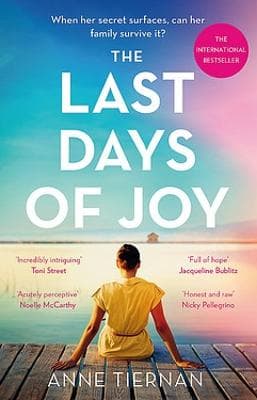Review: The Last Days of Joy
Reviewed by Erica Stretton
Anne Tiernan’s debut novel, The Last Days of Joy, starts with a bang: Joy’s holding a gun. A literal gun, to end her life, but also a metaphorical one — the secrets that have led her to this point. Her children, preoccupied by the complications of their own lives, are about to encounter their mother’s past. Their understanding, the foundations their personalities are built on, will be thoroughly shaken.
An intimate exploration of the reverberations of family trauma, Moa Press’s first novel of 2023 is the story of the Tobin family, originating from Ireland but now living in New Zealand, after an long-ago accident that, in its horror, isolated them from their community and made a fresh start desirable.
When Joy is found badly wounded and taken to hospital, not expected to live more than a few days, her three children dutifully come to her side in Tauranga. Each of them has baggage: Sinead, a frustrated writer, cannot write her second book and uses drugs to cope with life; Conor, chasing fame, has built himself a shallow, selfish world that’s about to implode; and Frances, unable to understand how her perfect family life became so unfulfilling, contemplates an affair and neglects her daughter’s emotional needs.
These four voices — because Joy, trapped in her body, in her hospital bed, brings her unexplained and traumatic past forth into the story in her dream-like sections — make up the book. Frances, Conor and Sinead are traumatised, caught between their unhealthy childhood with an alcoholic mother and the choices that will allow them to move forward. Memories bubble up and make them reluctant to visit Joy in hospital:
‘Frances always held her breath as she turned the corner into their cul-de-sac, closed her eyes for just a second… …Please let the milk be in. Milk in and curtains open meant at least her mother had at some stage got out of bed that day.’
As they hurtle toward decisions that will destroy their lives as they know it, their mother’s secrets begin to come to light, bringing shreds of understanding to her children. Letters hidden in her house and a strange visitor nobody knows, with a story that changes everything, further unravel their previous picture of her.
Like Irish novelist Marian Keyes, Tiernan uses sarcastic humour to belie the gut-wrenching situations Frances, Conor and Sinead find themselves in and to develop the bonds between the siblings. After Sinead’s admitted to hospital, Frances remarks to Conor:
‘Lindsay Lohan here has apparently been taking a substance originally used in explosives. Surprisingly, it doesn’t mix too well with alcohol. Or the human body.’
‘Shit. That’s all I need. Who else knows about it?’ Conor says.
Without this, it would be a very dark book but The Last Days of Joy allows space for empathy and growth. Joy’s three children are well-realised and distinct, the scars inflicted on them putting them into places where reflection and understanding are the only way to emerge intact. Contemplating her marriage, Frances muses on life:
‘she thinks how precarious it all is; we all teeter on the edge of one bad decision, one temptation, one momentary lapse in concentration…’
The secondary characters in their ordinary lives are occasionally somewhat two-dimensional, especially in the case of Andy, the ex-flame threatening Frances’ marriage, and Lara, the much younger intern with whom Conor’s involved. At times, the motivations and complexities of these strands could be more fully explored, but Tiernan’s management of the unravelling of Joy’s secrets is skilful, bringing the shadows of Ireland and Joy’s unhappy history to the fore.
The Last Days of Joy does important work, digging into the weight of trauma and how it echoes down generations, with a pacey unravelling plot that carries the story along and lets us feel Joy’s children’s grief and eventual understanding.
Reviewed by Erica Stretton
